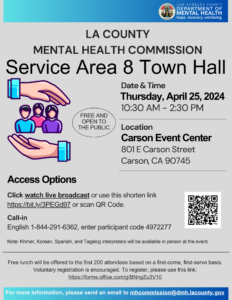- About the Mental Health Commission (MHC)
- Sign Up for MHC Updates
- Resources
- Commission Role
- Commissioners
- Past Meeting Agendas, Minutes, and Documents
- MHC Town Halls
News & Events
- Mental Health Commission Bylaws and WIC Code
- Mental Health Commission Annual Report
- MHC Meetings Announcement FY 2023-2024 – 2nd 6 months
- MHC Meetings Announcement FY 2024-2025 – 1st 6 months
- MHC Fact Sheet
- MHC Retreat FY 2023-2024 Priorities Report – December 2023
- MHC Retreat FY 2022-2023 Summary Report – February 2023
- MHC FY 2018-2019 Retreat – June 8, 2019
- MHSA Annual Update Public Hearing – March 28, 2019
- Board and Care Facilities Report
- Little Hoover Commission Response to Proposition 63
Vision
All Los Angeles County individuals, families, and communities have access to effective mental health care.
Mission
•To advise the Los Angeles County Board of Supervisors and Department of Mental Health Director on issues impacting the County mental health system.
•To review and approve the procedures used to ensure community and professional involvement at all stages of the planning process.
Values
Accountability for Care
We believe services and programs should be held to high quality standards and result in effective care and positive outcomes.
Access to Person Centered Care
We believe treatment should be easily accessed, in a welcoming and respectful environment, and tailored to meet differences in individual need. The individual should be a partner in their treatment process.
Comprehensive Care
We believe in the systematic coordination of health care that addresses mental health, substance abuse and primary care services to ensure the best outcomes for those with multiple healthcare needs. Comprehensive care should also address stigma and structural barriers to individuals in obtaining education, employment, secure housing and other needed services.
Trauma Informed Care
We believe the organization and treatment framework should involve understanding, recognizing and responding to the effects of all types of trauma, not just on the individual seeking treatment but to the family and community.
Community Responsive Care
We believe in recognizing individual and systematic bias and responding to issues that lead to disparities in either allocation of resources or poor outcomes for specific communities or sub-populations. Cultural customs, practices or rituals that can positively impact treatment outcomes should be identified and incorporated, where possible.

